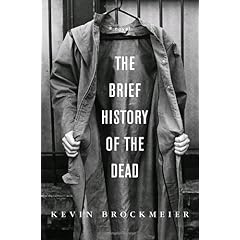Ti: The Physick Book of Deliverance Dane
(HC release 06/09/09)
Au: Katherine Howe
Bookmark: the giant wrap-around back cover thingee on the ARC ed.
A very early reviewer (also being a staffer at my illustrious workplace) compared this book to Monster's of Templeton, and for this review was granted space on the splash page of the ARC. I have to agree with his assessment. Both stories boast a fairly similar heroine and both manage to bring elements of the fantastic into the "real" world where the books are set in a very casual way - as if giant lake monsters and actual witches in colonial Salem are everyday stuff. I think 'Monsters' accomplishes this in a more subtle way - as the townspeople don't seem particularly shocked by the monster (although the outside world is), while Connie is continually taken aback by what she finds as she pursues the Physick Book. I suppose this makes 'Physick' more realistic and 'Monsters' more fun.
Connie is a graduate student in colonial american history who gets sucked into trying to pull together her dead grandmother's abondoned, centuries-old house near Salem Mass., while her hippy-dippy mother spends her time reading auras on the west coast. All the while, she's supposed to be figuring out what to do for her dissertation. While picking through the items left in the house (an electricity and phone free house), she comes across the name of a Deliverance Dane. Luckily armed with professional-level histrical research skills and a cute boy who does restorations for a living, Connie tries to track down records of Deliverance, thinking that this little character would be a great start on her original disseration. She finds pretty quickly that efforts have been made to erase Deliverance from certain records completely, which brings her to understand that this character was not only involved in the Salem trials, but was also somehow set apart from the other accused women in the minds of the populace at the time.
Meanwhile, we flash back to the 1690's and watch Deliverance herself moving through life, as well as eventually following some of her descendants. The result is a picture of a long line of no-nonsense ladies. Gotta love the girl power.
I liked each of the story lines in this novel, but in a different way. The modern day action moves more quickly (as you might expect), and draws you in with it's speed, but not necessarily with it's depth. The flashback scenes I found more compelling and think that their slower speed may have even helped add to the sense of stress, burden and foreboading that present themselves at different points in the history.
I'm not sure how to characterize this book. It's not "literature." It might be a historical novel with a thriller twist. I hate to call this chick-lit, because it's better than that, but I'm afraid the abundance of strong ladies in the book might scare off many gentlemen readers, just as if they were stuck in room with all the characters.



